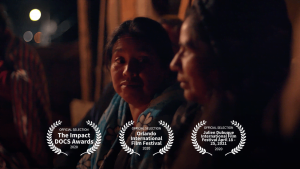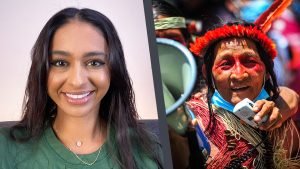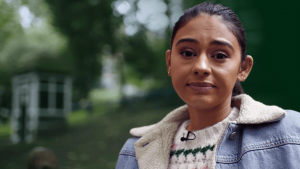
A year in review
This December, we at Doha Debates are taking some time to reflect and to look back at 2021. If 2020 was defined by the coronavirus pandemic, 2021 was defined in contrasts: Many countries, particularly in the global north, had successful vaccine rollouts and began to see the return of some pre-pandemic norms, but the global south remains largely unvaccinated. Meanwhile, the conversation around climate change intensified when the IPCC released a report in August, sounding alarm bells about the irreversibility of global warming — but we also saw so many young people cut through empty political platitudes to demand a secure, sustainable future. As climate activist Vanessa Nakate said at the Youth4Climate conference in Milan, “We are drowning in promises.” She — and many other activists focused on critical issues — have made one thing very clear in 2021: People are taking action.
We invite you to look through some of our favorite projects from this year, which showcase people whose on-the-ground efforts lead to real change. Some campaigned for equality; some fought against the climate crisis. Some used art; some used sport. Some bridged divides in their communities — and some even took on the world.
TAKING ACTION FOR EQUALITY
“If you were presented with the opportunity to save an innocent life…would you?”
This year, in partnership with Shared_Studios, Doha Debates launched the inaugural Ambassador program. Between August and October, the 36 ambassadors, all between the ages of 18 and 25 and representing 17 countries on five continents, participated in nine virtual sessions. They met with global experts and community leaders on issues like climate change, forced displacement and refugees and gender inequality, and developed critical systems-thinking and leadership skills. One of our ambassadors, Omar Alshogre, recently gave a moving speech to the United Nations about his experiences as a Syrian refugee. Watch the speech below.
“Now is our time. We have to claim our rights ourselves.”
In Galicia, an autonomous community in Spain, fishing has been a primary source of income for generations — and Galician women have been the primary weavers of fishing nets for just as long. Sea Weavers, set against the crashing waves of Galicia, shows a collective of women who are demanding equal rights to the men in their industry. Watch the short film below.
“For the first time, I felt what it was like to have hope.”
After nearly being beaten to death for stealing a mango in Kibera, Africa’s largest slum, Kennedy Odede became a leader in his community, helping millions of people access clean water and finding fulfillment along the way. Watch his story below.
TAKING ACTION THROUGH ART
“I want to let the world know that many children were killed.”
Palestinian refugee and artist Ismail Matar has seen much of his street art removed or destroyed through the three wars he has witnessed in his lifetime. But, he says, he doesn’t want to paint about sadness or depression — he wants to show the world what life is like for Palestinians, even when his art crumbles from bomb blasts. Watch him paint a brighter future in the short film below.
“We have the power and strength to transform imposter syndrome into determination and success.”
Social justice and education advocate Ayan Said shared with us her poem about how we all have the right to be treated as a human being with equal value. In just over a minute, Ayan’s words will make you feel a little more empowered and valued. Watch below.
“Fear became courage in order to transform what was happening.”
The small Indigenous community of Cherán, in the state of Michoacán in western Mexico, saw violence, corruption and illegal deforestation creeping into their small town. Led by the women of Cherán, they decided to take their community back — kicking out drug cartels and establishing autonomous rule. Watch the short film Cherán: The Burning Hope below.
TAKING ACTION ON CLIMATE CHANGE
A life without water
In the imaginative narrative fantasy The Water Queen, a young woman in South Africa sets out to find water for her dying brother and is transported to a world where she is given the power to rescue her entire parched community. This short film straddles the bleak realities of water scarcity and the hope and spirituality that bring people together in times of crisis. Watch below.
“When you have relationship with Mother Earth, you have responsibility.”
In a #DearWorldLive season focused on climate change, experts and activists weighed in on forced migration, the food supply, and, in the episode below, Indigenous solutions to the climate crisis. When it comes to saving the planet, why is it crucial that we listen to Indigenous voices? Melina Laboucan-Massimo (Lubicon Cree from Northern Alberta, Canada) and Tyson Yunkaporta (Apalech clan from Far North Queensland, Australia) have some answers — as well as a thought-provoking, lively conversation.
“Wealthier nations live and operate at the ecological expense of other countries.”
The effects of climate change are not being experienced equally across the globe — but what does that look like, and how will it impact our future? Host Nelufar Hedayat and climate scientist Josh Willis go back to basics on the science of climate change, what climate colonialism is and why it matters. Watch below.
TAKING ACTION THROUGH SPORT
“Sports is how I learned to advocate for myself. It’s where I found my voice.”
Sports may seem like a surprising way to take action — but social justice has long been a part of athletic history. In the new podcast The Long Game from Doha Debates and Foreign Policy, host Ibtihaj Muhammad — herself an Olympic medalist and one of the first Muslim athletes to compete in hijab — talks to cricket players, Syrian refugee swimmers, basketball players and more. Each episode tells a story of courage and conviction, illuminating how athletes fight for themselves and their communities through their sport. Listen to the first four episodes below, and follow and subscribe wherever you get your podcasts.
















